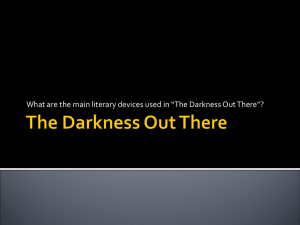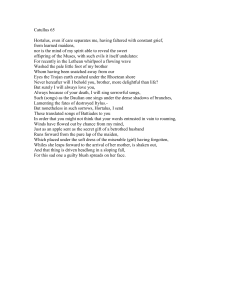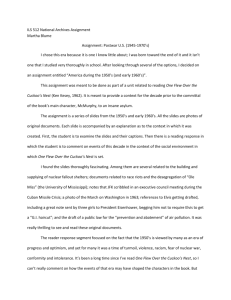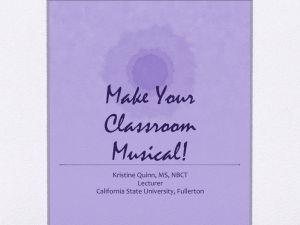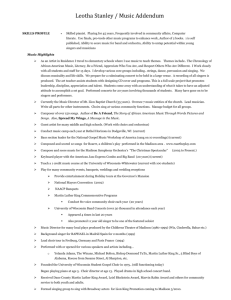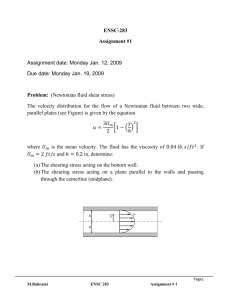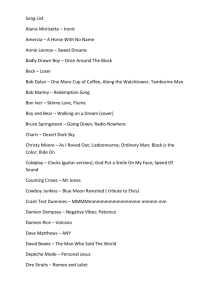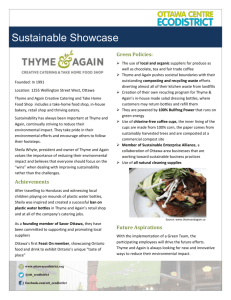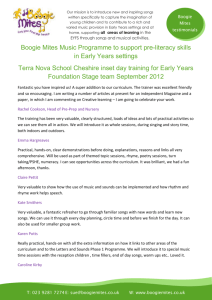ThymeProgram.doc - Paul Hodges`s home page.
advertisement
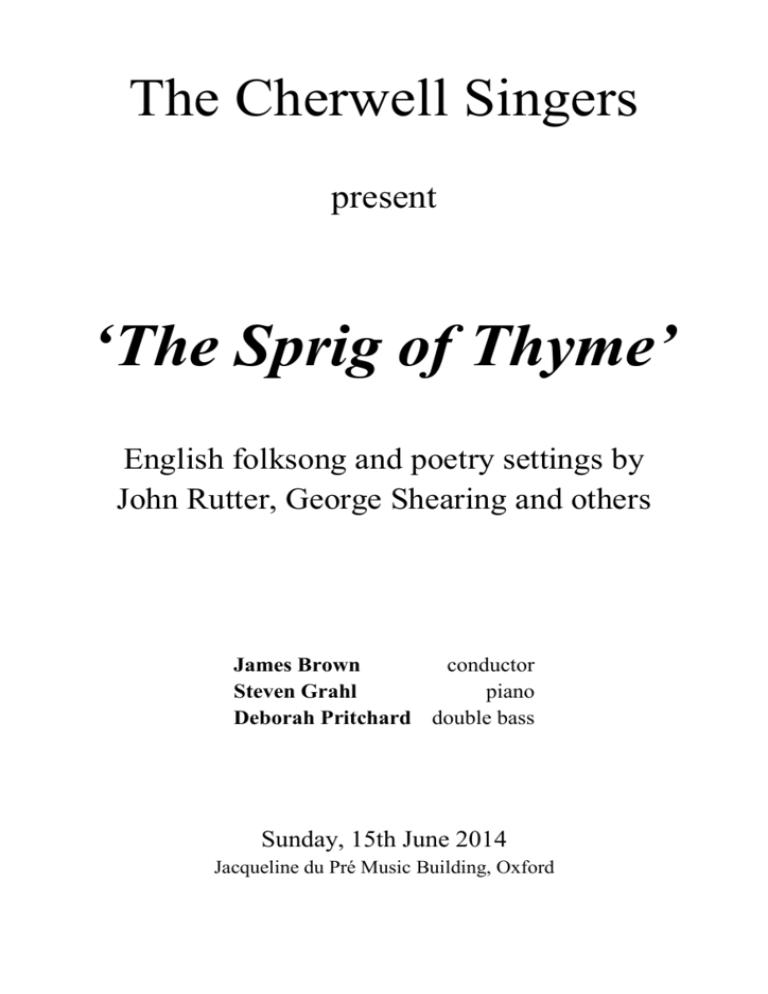
The Cherwell Singers present ‘The Sprig of Thyme’ English folksong and poetry settings by John Rutter, George Shearing and others James Brown conductor Steven Grahl piano Deborah Pritchard double bass Sunday, 15th June 2014 Jacqueline du Pré Music Building, Oxford Programme The Sprig of Thyme John Rutter (1945- ) The bold grenadier The willow tree The sprig of thyme Down by the sally gardens The cuckoo Afton water Early one morning Edward Higginbottom (1946- ) The water of Tyne Michael Neaum (1939- ) Londonderry Air Bob Chilcott (1955- ) Interval My true love hath my heart Lullaby of Birdland John Rutter George Shearing (1919-2011) Songs and Sonnets from Shakespeare George Shearing Live with me and be my love When daffodils begin to peer It was a lover and his lass Spring Who is Sylvia? Fie on sinful fantasy Hey, ho, the wind and the rain The Sprig of Thyme Our summer concert links two English composers who were both born in London but spent much of their working lives in America. Moreover, they became friends and colleagues, and one of the pieces that we will perform is dedicated by one to the other. John Rutter needs little introduction to those familiar with choral music, and we will perform movements from his cycle of folk song settings The Sprig of Thyme. Complementing this will be other settings of folk-songs and poetry from contemporaries of Rutter. The second half of the concert will be a tribute to the great jazz musician and composer George Shearing. We will perform Rutter’s tribute to Shearing in the form of one of his Birthday Madrigals dedicated to the older man. And we will end with Shearing’s Songs and Sonnets from Shakespeare, which echo the pastoral themes of the folksongs heard earlier in the concert and which reflect Shearing’s English musical background and American jazz influence. As a further link between the two halves of the programme it is worth noting that Songs and Sonnets from Shakespeare were conducted by Rutter with the composer at the piano at their first performance in 1999. James Brown Notes and texts John Rutter grew up living over The Globe pub on London’s Marylebone Road. He was educated at Highgate School, where a fellow pupil was John Tavener, before reading music at Clare College, Cambridge. Subsequently he served as director of music at Clare College, and led the choir to international prominence. In 1981, Rutter founded his own choir, the Cambridge Singers, which he conducts and with which he has made many recordings of sacred choral repertoire (including his own works). He now lives in Cambridgeshire and frequently conducts many choirs and orchestras around the world. Rutter also works as an arranger and editor. He collaborated with Sir David Willcocks on the extraordinarily successful Carols for Choirs anthology series. His work in music has been recognised by a number of awards, including a CBE and a Lambeth Doctorate of Music. Folk songs have passed down from generation to generation, telling timeless stories of ordinary people’s lives. In The Sprig of Thyme Rutter has collected songs from across the British Isles and Ireland which make up a colourful musical patchwork of human experience. Through simple, direct language and lilting melodies, the songs tell us about the complexities of human life - especially where love is concerned! Rutter wrote about his feelings for this music: For children growing up in post-war England as I did, traditional songs still form a common musical currency. These songs brought me delight and pleasure then, and they still do now, though pleasure has become tinged with nostalgia because, for the most part, they are forgotten and gone from our lives, perhaps forever. The Sprig of Thyme is an affectionate tribute to their composers and poets; a few were renowned, most were obscure or unknown, but the songs they created were famous, and I remember them fondly. Rutter’s arrangements give new life to these songs, passing on his delight and pleasure to us, both as singers and as listeners. The collection contains eleven settings, of which we have chosen six for this evening’s concert. The bold grenadier warns that young girls should beware of falling for dashing soldiers, who will surely love them and leave them. As I was a-walking one morning in May, I spied a young couple a-making of hay. O one was a fair maid and her beauty shone clear, And the other was a soldier, a bold grenadier. ‘Good morning, good morning, good morning,’ said he: ‘O where are you going, my pretty lady?’ ‘I am going a-walking by the clear crystal stream, To see cool waters glide and hear nightingales sing.’ ‘O soldier, O soldier, will you marry me?’ ‘Oh, no my sweet lady, that never can be: For I’ve got a wife at home in my own country; Two wives and the army’s too many for me.’ As I was a-walking one morning in May I spied a young couple a-making of hay. O one was a fair maid and her beauty shone clear, And the other was a soldier, a bold grenadier. The willow tree is a young man’s lament – for lost wealth, a false friend, lost love and lost hope. O take me to your arms, love, for keen doth the wind blow, O take me to your arms, love, for bitter is my deep woe. She hears me not, she heeds me not, nor will she listen to me, While here I lie alone to die beneath the willow tree. My love hath wealth and beauty, rich suitors attend her door, My love hath wealth and beauty, she slights me because I’m poor. The ribbon fair that bound her hair is all that is left to me, While here I lie alone to die beneath the willow tree. I once had gold and silver, I thought them without end, I once had gold and silver, I thought I had a true friend. My wealth is lost, my friend is false, my love hath he stolen from me, While here I lie alone to die beneath the willow tree. The sprig of thyme warns young girls of the dangers of falling in love. In folk lore, thyme is a symbol of innocence; once stolen, it is lost for ever. In this song, first documented in 1689, a false young man steals a maiden’s love, and then deserts her. She waits for time to pass and for the thyme in her garden to grow again, but cannot forget her love. Once I had a sprig of thyme. It prospered by night and by day Till a false young man came a-courting to me, And he stole all this thyme away. The gardener was standing by: I bade him choose for me. He chose me the lily and the violet and the pink But these I refused all three. Thyme it is the prettiest thing, And time it will grow on, And time it will bring all things to an end, And so does my time grow on. It’s very well drinking ale, And it’s very well drinking wine: But it’s far better sitting by a young man’s side That has won this heart of mine. Down by the sally gardens is a mature man’s lament for lost love and lost youth. He regrets that he could not be carefree and light-hearted in his youth, as his sweetheart advised him; now it’s too late. Down by the sally gardens my love and I did meet. She passed the sally gardens with little snow-white feet. She bid me take love easy, As the leaves grow on the tree. But I being young and foolish, With her did not agree. In a field by the river my love and I did stand. And on my leaning shoulder she placed her snow-white hand. She bid me take life easy, As the grass grows on the weirs. But I was young and foolish, And now am full of tears. W. B. Yeats (1865–1939) The cuckoo tells of the joy of falling in love and the pain of betrayal. A girl wishes she could tell all men of the pain and grief their lies cause. O the cuckoo she’s a pretty bird, she singeth as she flies; She bringeth good tidings, she telleth no lies. She sucketh white flowers, for to keep her voice clear; And the more she singeth cuckoo, the summer draweth near. As I was a-walking and a-talking one day, I met my own true love, as he came that way. O to meet him was a pleasure, though the courting was a woe, For I found him false-hearted, he would kiss me and go. I wish I were a scholar and could handle the pen, I would write to my lover and to all roving men. I would tell them of the grief and woe that attend on their lies, I would wish them have pity on the flower when it dies. Afton water tells of happy mutual love; a faithful couple live an idyllic rural life, accompanied by the sound of the sweetly-flowing river. Flow gently, sweet Afton, among thy green braes, Flow gently, I’ll sing thee a song in thy praise. My Mary’s asleep by thy murmuring stream, Flow gently, sweet Afton, disturb not her dream. How lofty, sweet Afton, thy neighbouring hills, Far marked with the courses of clear winding rills. There daily I wander as dawn rises high, My flocks and my Mary’s sweet cot in my eye. How pleasant thy banks and green valleys below, Where wild in the woodlands the primroses blow! There oft as mild evening creeps over the lea, The sweet-scented birk shades my Mary and me. Flow gently, sweet Afton, among thy green braes, Flow gently, sweet river, the theme of my lays. My Mary’s asleep by thy murmuring stream, Flow gently, sweet Afton, disturb not her dream. Robert Burns (1759–1796) Edward Higginbottom has been Organist and Director of the Choir at New College, Oxford since 1976; he retires from the post later this year. Early one morning just as the sun was rising, I heard a young maid sing in the valley below. Oh, don’t deceive me, oh, never leave me, How could you use a poor maiden so? Remember the vows that you made to your Mary, Remember the bow’r where you vowed to be true, Oh, don't deceive me, Oh gay is the garland and fresh are the roses, I’ve culled from the garden to place upon thy brow. Oh, don't deceive me, Thus sang the poor maiden her sorrows bewailing, Thus sang the poor maid in the valley below. Oh, don’t deceive me, oh, never leave me, How could you use a poor maiden so? In The water of Tyne the singer laments as she awaits a ferryman to take her to her beloved across the river that separates County Durham from Northumberland. The song was taken down from the singing of an old man at Hexham. I cannot get to my love if I would dee, The water of Tyne runs between him and me; And here I must stand with a tear in my e’e, Both sighing and dying my sweetheart to see O where is the boatman? my bonny hinny! O where is the boatman? Bring him to me, To ferry me over the Tyne to my honey, And I will remember the boatman and thee. O bring me a boatman, I'll give any money, And for your trouble rewarded will be, To ferry me over the Tyne to my honey, Or scull him across that rough water to me. Danny Boy was written by English lawyer and lyricist Frederic Weatherly in Bath, Somerset in 1910, for a tune other than Londonderry Air. After his Irish-born sister-in-law Margaret (known as Jess) in the United States sent him a copy of Londonderry Air in 1913, Weatherly modified the rhythm and metre of Danny Boy to fit the tune. Oh, Danny Boy, the pipes, the pipes are calling From glen to glen, and down the mountain side, The summer’s gone, and all the roses falling, It’s you, it’s you must go and I must bide. But come ye back when summer’s in the meadow, Or when the valley’s hushed and white with snow, It’s I’ll be here in sunshine or in shadow, Oh, Danny Boy, oh Danny Boy, I love you so! But when ye come, and all the flowers are dying, If I am dead, as dead I well may be, Ye’ll come and find the place where I am lying, And kneel and say an Ave there for me; And I shall hear, though soft you tread above me, And all my grave will warmer, sweeter be, For you will bend and tell me that you love me, And I shall sleep in peace until you come to me! Frederic Weatherly (1848-1929) Birthday Madrigals was written by Rutter at the invitation of Brian Kay, conductor of the Cheltenham Bach Choir, to celebrate the seventy-fifth birthday of the great jazz pianist George Shearing, to whom the piece is dedicated. The first performance was given, in his presence, in 1995 by the Cheltenham Bach Choir with the composer conducting. We are performing just one of the set tonight. My true-love hath my heart and I have his, By just exchange one for the other given: I hold his dear, and mine he cannot miss; There never was a bargain better driven. His heart in me keeps me and him in one; My heart in him his thoughts and senses guides: He loves my heart, for once it was his own; I cherish his because in me it bides. His heart his wound received from my sight; My heart was wounded with his wounded heart; For as from me on him his hurt did light, So still, methought, in me his hurt did smart: Both equal hurt, in this change sought our bliss, My true love hath my heart and I have his. Sir Philip Sidney (1554-1586) George Shearing was born in Battersea, South London, in 1919, the youngest of nine children. Blind from birth, he began picking out melodies on a piano at the age of three and was soon able to play any tune by ear. His only formal musical education was at Linden Lodge School for the Blind, where he studied for four years and began playing classical music. Though he was subsequently offered several scholarships, Shearing opted to launch his career by performing at a local pub, the Mason’s Arms in Lambeth, for ‘25 bob a week’ (£1.25 in today’s parlance), playing piano and accordion. He also joined an all-blind jazz orchestra. In 1947 Shearing moved to New York, where he became one of America’s most popular recording and performing artists. He had an apartment in New York and a cottage in the Cotswolds, and regarded London as ‘home’ whenever he performed there. He was knighted in 2007. Lullaby of Birdland is a tune written by George Shearing in 1952 in honor of Charlie ‘Bird’ Parker, and ‘Birdland’, the jazz club named after him. Shearing recorded his instrumental version for the radio show and ultimately adopted it as the theme song for his quintet. Songs and Sonnets from Shakespeare was commissioned by the Mostly Madrigal Singers, Illinois, and was first performed by them in 1999. The performance was conducted by John Rutter, with Shearing himself at the piano. Rutter was a valued member of the production team; in Shearing’s own words, ‘one of the very best choral writers and directors in the business….a man whom I am honoured to be able to call a very dear friend.’ He went on to say, ‘And if Mr Shakespeare hadn’t done HIS part in the first place, we’d all be in the soup. Enjoy!’ It would be difficult to disobey him. These seven songs, arranged for choir, piano and double bass, which John Rutter ‘instantly fell in love with’ and described as ‘so fresh and youthful, so witty, tender and varied’, cannot fail to delight singers and listeners alike. Shakespeare (1564-1616) made music very much a part of his plays, and his theatre company had numerous instruments it could use, including plucked instruments (such as the lute), bowed string instruments, woodwinds, brass, and drums. So Shakespeare used, for example, martial drums to accompany battlefield scenes, trumpet flourishes for royal entrances and exits, and other instruments to provide mood-setting pieces (such as the “sounds and sweet airs that give delight and hurt not” in The Tempest, a play that is especially suffused with music). In addition, there were numerous songs sung by characters during the action of the plays. One can easily imagine that if George Shearing had been available, Shakespeare would have made use of his talents. The words to the first song, Live with me and be my love, are not Shakespeare’s, but are quoted by him. They are generally attributed to his fellow dramatist, Christopher Marlowe (1564 -1593) and the last verse to Sir Walter Raleigh (1554-1618). Live with me, and be my love, And we will all the pleasures prove That hills and valleys, dales and fields, And all the craggy mountains yields. There will we sit upon the rocks, And see the shepherds feed their flocks, By shallow rivers, by whose falls Melodious birds sing madrigals. There will I make thee a bed of roses, With a thousand fragrant posies, A cap of flowers, and a kirtle Embroider’d all with leaves of myrtle. A belt of straw and ivy buds, With coral clasps and amber studs; And if these pleasures may thee move, Then live with me and be my love. LOVE’S ANSWER If that the world and love were young, And truth in every shepherd’s tongue, These pretty pleasures might me move, To live with thee and be thy love. Christopher Marlowe and Sir Walter Raleigh (last verse), quoted by William Shakespeare in The Merry Wives of Windsor, Act 3, Scene 1. When daffodils begin to peer comes from The Winter’s Tale (Act 4 Scene 2) where it is sung by the vagabond thief, Autolycus, “a snapper-up of unconsidered trifles.” And, as the song tells us, his irresponsibility extends to women of easy virtue. When daffodils begin to peer, With heigh! The doxy over the dale, Why, then comes in the sweet o’ the year; For the red blood reigns in the winter’s pale. The white sheet bleaching on the hedge, With heigh! the sweet birds, O, how they sing! Doth set my pugging tooth on edge; For a quart of ale is a dish for a king. The lark, that tirra-lirra chants, With heigh! with heigh! the thrush and the jay, Are summer songs for me and for my aunts, While we lie tumbling in the hay. Next comes the very familiar It was a lover and his lass from As You Like It (Act 5 Scene 3) where it is sung by a page. In the play, Touchstone, the clown, comments that it is a foolish song–“there was no great matter in the ditty”–but it and the familiar tune have retained their hold over the years. It was a lover and his lass, With a hey, and a ho, and a hey-nonny-no, That o'er the green cornfield did pass In springtime, the only pretty ring time, When birds do sing, Hey ding a ding, ding. Sweet lovers love the spring. Between the acres of the rye, With a hey, and a ho, and a hey-nonny-no, These pretty country folks would lie In springtime, the only pretty ring time, When birds do sing, Hey ding a ding, ding. Sweet lovers love the spring. This carol they began that hour, With a hey, and a ho, and a hey hey-nonny-no, How that a life was but a flower In springtime, the only pretty ring time, When birds do sing, Hey ding a ding, ding. Sweet lovers love the spring. And therefore take the present time, With a hey, and a ho, and a hey hey-nonny-no, For love is crownèd with the prime In springtime, the only pretty ring time, When birds do sing, Hey ding a ding, ding. Sweet lovers love the spring. Far less familiar is the fourth song, Spring, taken from a play that is not so frequently performed, Love’s Labour’s Lost (Act 5 Scene 2). This song and a companion piece, Winter, form part of a pageant that closes the play; the two songs speaking of the cuckoo and the owl respectively. Commonly in this period the cuckoo represents scorn for men who have been cuckolded. When daisies pied, and violets blue, And lady-smocks all silver-white, And cuckoo-buds of yellow hue Do paint the meadows with delight, The cuckoo then, on every tree, Mocks married men, for thus sings he: “Cuckoo! Cuckoo, cuckoo!” O word of fear, Unpleasing to a married ear. When shepherds pipe on oaten straws, And merry larks are ploughmen’s clocks, When turtles tread, and rooks, and daws, And maidens bleach their summer smocks, The cuckoo then, on every tree, Mocks married men, for thus sings he: “Cuckoo! Cuckoo, cuckoo!” O word of fear, Unpleasing to a married ear. The next song, Who is Sylvia? from The Two Gentlemen of Verona (Act 4 Scene 2), hardly needs an introduction, especially after it was made famous by Schubert’s setting of the lyrics. Shearing’s variation might, perhaps, be somewhat too languorous for the stage, but it certainly conveys the dreamy fantasy of a lover’s imagination. Who is Silvia? what is she, That all our swains commend her? Holy, fair, and wise is she; The heaven such grace did lend her, That she might admirèd be. Is she kind as she is fair? For beauty lives with kindness. Love doth to her eyes repair, To help him of his blindness, And, being helped, inhabits there. Then to Silvia let us sing, That Silvia is excelling; She excels each mortal thing Upon the dull earth dwelling: To her let us garlands bring. The sixth song, Fie on sinful fantasy, which occurs in the final scene of The Merry Wives of Windsor (Act 5 Scene 5), provides a complete change of pace and mood. In the play, Falstaff has been tricked into appearing dressed up in stag’s horns as Herne the Hunter in expectation of a liaison with Mistress Page and Mistress Ford; but instead, he is burned with tapers by other characters disguised as fairies and is berated for his lustfulness. Fie on sinful fantasy! Fie on lust and luxury! Lust is but a bloody fire, Kindled with unchaste desire, Fed in heart, whose flames aspire As thoughts do blow them, higher and higher. Pinch him, fairies, mutually; Pinch him for his villany; Pinch him, and burn him, and turn him about, Till candles and starlight and moonshine be out. The final song, When that I was and a little tiny boy, is sung by the clown, Feste, at the very end of Twelfth Night. The words summarize the unfortunate life of a drunkard, a sharp contrast with the much happier resolution afforded to the lovers in the play. When that I was and a little tiny boy, With hey, ho, the wind and the rain, A foolish thing was but a toy, For the rain it raineth every day. But when I came to man’s estate, With hey, ho, the wind and the rain, ’Gainst knaves and thieves men shut their gate, For the rain it raineth every day. But when I came, alas! to wive, With hey, ho, the wind and the rain, By swaggering could I never thrive, For the rain it raineth every day. But when I came unto my beds, With hey, ho, the wind and the rain, With toss-pots still had drunken heads, For the rain it raineth every day. A great while ago the world begun, With hey, ho, the wind and the rain, But that’s all one, our play is done, And we’ll strive to please you every day. Biographies Deborah Pritchard double bass Deborah gained her MMus at the Royal Academy of Music, holding the Junior Manson Fellowship, and was awarded her DPhil from Oxford University under Robert Saxton. She studied the double bass at the Guildhall School of Music and Drama. Deborah is also a composer whose work has been broadcast by the BBC, released by NMC and premiered by the Philharmonia Orchestra, BBC Singers, Allegri String Quartet, and Christ Church Cathedral Choir. She teaches composition tutorials at the University of Oxford, and has recently been awarded a place at the Leighton Artists’ Colony, Banff. Steven Grahl piano Steven enjoys a varied career as both organist and conductor. He currently combines the post of Assistant Organist at New College, Oxford with that of Organist & Director of Music at St Marylebone Parish Church, London. In September he takes up a new post as Director of Music at Peterborough Cathedral. He is a member of the Oxford University Faculty of Music, and since 2006 he has held the Principal Conductorship of the Guildford Chamber Choir. Recent years have seen performances in America, France, Germany, Italy and Spain, and at numerous prestigious UK venues, such as Westminster Cathedral and St John’s Smith Square. A prize-winning graduate of Magdalen College, Oxford (where he was Organ Scholar) and the Royal Academy of Music, Steven gained the Limpus (highest mark) and Dixon (improvisation) prizes in his FRCO examination, and he is also a holder of the Worshipful Company of Musicians’ Silver Medallion. James Brown conductor James was Organ Scholar of Girton College, Cambridge and upon graduating studied organ at the Conservatoire de Musique, Geneva with Lionel Rogg. After two years working as an organist in Texas, James returned to England where he is currently Organist of the University Church, Oxford and a lay clerk in New College Choir, with whom he tours regularly as well as participating in broadcasts and recordings. James is also a pianist for the cruise lines Swan Hellenic and Fred Olsen, and tomorrow departs for a two week cruise to Iceland. Future cruises for 2015 include North Africa, Spain and Portugal. James teaches organ at Abingdon School and New College School and performs regularly with various choirs and choral societies, including the Oxford Bach choir with whom he performs the Duruflé Requiem in Belgium later this year. James has conducted the Cherwell Singers since 2007. The Cherwell Singers Soprano Rebecca Bullard Laura Ciccolallo Janet Johnson Clare Scott-Dempster Lucinda Herington Dorien Schouten Stephanie Sumner-Jones Lucy Watson Steph White Tenor Jeremy Bryans Iain McLean Guy Peskett David Sutton Alto Virginia Allport Rachel Bryans Katherine Butler Julia Middleton Sally Prime Penny Jacques Bass Neil Herington Paul Hodges Simon Jones Tim Wainwright Jonathan Mapley Simeon Mitchell Gerald Pickford The Cherwell Singers is looking to recruit voice members in all parts. If you are interested in joining us please contact James Brown at: director@cherwellsingers.org The choir is available to hire for weddings and other events. To discuss prices and possible repertoire, please contact James Brown at: director@cherwellsingers.org Please visit our web site to learn more about the choir, and listen to some of our recordings online. Use the web form to register yourself on our email list, to ensure you receive notification and full details of future concerts. www.cherwellsingers.org
